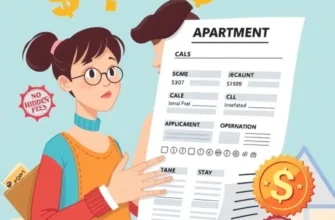Navigating the rental market can be like playing dodgeball with housing ads—exciting yet perilous, especially for young adults and first-time renters. With housing prices soaring and rental demands high, it’s easy to find yourself at the mercy of a rental scam, which can leave you feeling like you’ve been dealt a bad hand. Whether you are a young professional excited to move into your first apartment, a couple dreaming of a cozy home, or a family searching for that perfect nest, this guide is here to add a little humor to the often frustratingly serious task of rental hunting. Let’s tackle the rental scams you need to avoid like the plague, arm you with useful tips to spot the warning signs, and help you find a place to call home without losing your peace of mind (or your hard-earned cash).
The Classic ‘Too Good to be True’ Deal

The allure of a seemingly perfect apartment at an unbelievably low price can be tempting. However, such deals often mask the deceptive tactics of rental scams. To protect yourself, it’s vital to recognize the signs that a listing might be a scam.
First, scrutinize the price. If the rental rate is significantly below the average in the area, consider this a major red flag. Scammers often use attractive pricing to lure unsuspecting individuals who are eager to make a quick decision without thorough vetting. Conduct a market analysis, comparing the price with similar listings to understand the typical range for the area.
Fake listings frequently feature stunning photos that look too professional. These images might be stolen from other legitimate websites or heavily edited. A quick reverse image search can reveal if the pictures are used elsewhere on the Internet, indicating they might not belong to the listing in question.
Communication style is another key indicator. Scammers often communicate exclusively via email or text, avoiding phone calls. They might use generic greetings and display poor grammar, which can signal that their intention is not genuine. Be cautious if the landlord or agent is unreasonably insistent on collecting a deposit before you’ve seen the property.
Also, pay attention to urgency. If the listing demands immediate action or threatens that the deal will expire soon, step back. Scammers create a false sense of scarcity to pressure potential renters into making hasty decisions.
Be wary if accessing the property becomes complicated. A landlord who is unable to show the apartment physically and suggests working through third-party services or wires for payments is often hiding something. Authentic landlords or property managers typically facilitate in-person showings.
Lastly, after identifying a suspicious listing, verify its legitimacy. Cross-check the listing on different rental platforms to see if it appears elsewhere with varying details. Furthermore, a way of checking legitimacy is to consult local rental market guides, like this Miami rental market guide, for insights into genuine pricing and rental norms.
Identifying these scam signs early can save you from financial loss and emotional stress. A keen eye for these details will help safeguard your journey to finding your next home, without falling prey to flashy, too-good-to-be-true deals.
Phantom Landlords and the Art of Avoiding Them

Falling victim to a phantom landlord scheme can be devastating. These scams are cleverly designed to strip you of your hard-earned money without providing a liveable space in return. Imagine finding the perfect listing, paying the required deposit, and then discovering the property owner doesn’t exist. This ordeal can be financially and emotionally draining, reinforcing the need for vigilance.
The typical scam involves fake landlords convincing potential tenants to send deposits for properties they have no right to lease. These con artists often advertise on popular listing websites where they highlight attractive apartments at below-market prices. Once they grab your interest, they pressure you into quick decisions by claiming high demand for the space. They’ll then request a deposit via wire transfer or another untraceable method, promising to mail the keys. No keys arrive, and neither does your landlord.
Authentication of the legitimacy of your potential landlord is crucial. Start by conducting a reverse image search on the property photos. Scammers often use stolen photos from real listings. If these images appear elsewhere in unrelated listings, it’s a strong indicator of fraud.
Always verify ownership. Request to see the landlord’s identification and deeds to the property. Check their name against public property records to ensure accuracy. Legitimate landlords should have no qualms about providing you with this information. Meet the landlord in person, preferably at the property itself. This gives you the opportunity to inspect the property, ask detailed questions, and gauge their responses.
Ask the right questions to scrutinize their legitimacy. Inquire about what’s included in the rent, any pending repairs, or past tenant experiences. Observe their reactions—vague answers or reluctance to share information are red flags. Make sure their expectations match what’s normal for the rental market you’re exploring.
Relying on rental agencies can mitigate the risk of scams. Agencies handle numerous property transactions and have legal obligations that personal landlords might bypass. Research any agency thoroughly, seeking reviews and recommendations from trusted sources.
If you’re researching, make sure to use secure channels like these vetted apartment search websites to minimize exposure to fraudulent listings. Avoid using unsecured networks or oversharing personal information that scammers could exploit.
In case you’ve been scammed, report the incident to local authorities and real estate boards immediately. Document all communications and transactions. Although recovery of lost funds is rare, authorities can prevent future scams by pursuing these criminals.
Remember, dealing with eccentric landlords is potentially exasperating but better than losing everything to a phantom operator. Practice due diligence to ensure your next home is both real and from a trustworthy source.
Final words
Armed with the right knowledge and a skeptical eye, the rental market doesn’t have to feel like a roller coaster you didn’t sign up for. Remember, it’s okay to question listings, meet your landlord before signing, and to trust your gut when something feels ‘off’. When you spot a scam early, you can dodge unwanted drama and move into a home that is perfect for you—one without the baggage of stress and frustration. Happy renting!









